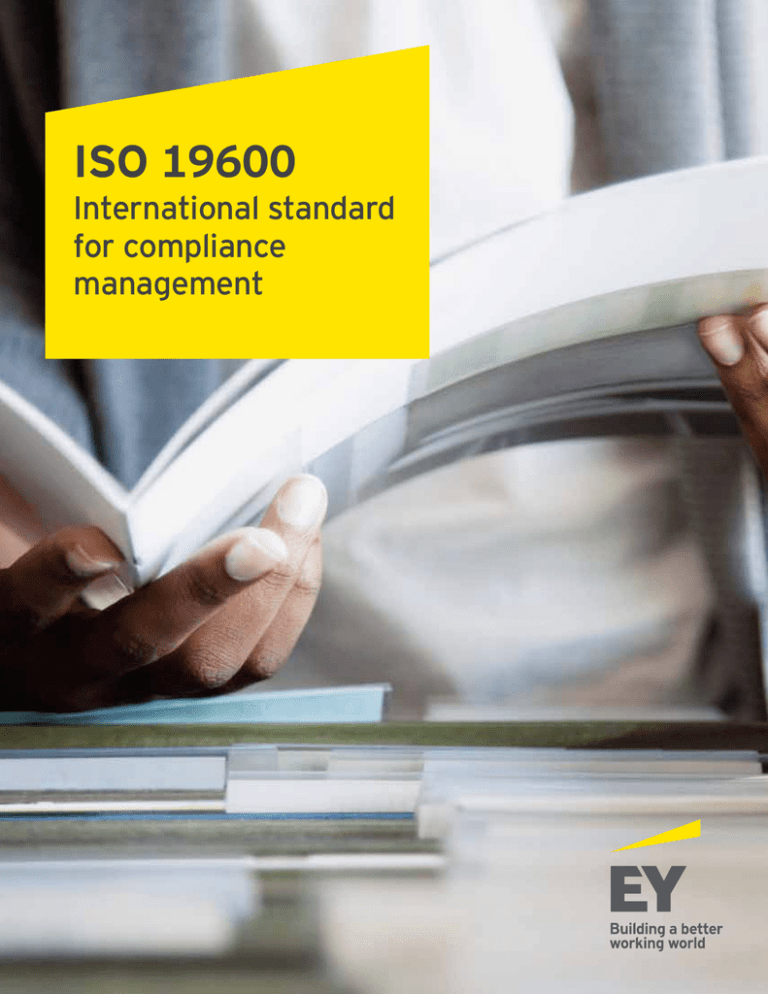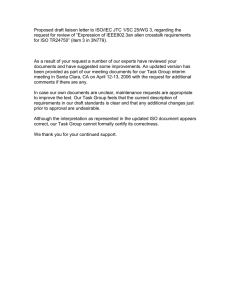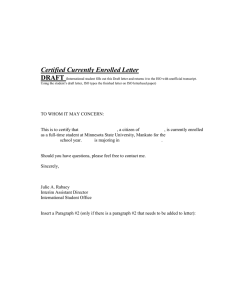
ISO 19600
International standard
for compliance
management
The new ISO 19600, rolled out December 2014, is expected to
serve as an international standard and a global benchmark for
compliance management programs. Corporate compliance is one
of management’s highest risk concerns. Implementation of a robust
compliance and ethics program based on company values and
appropriate risk based compliance has helped companies maintain
integrity and avoid or minimize noncompliance issues. It is not
surprising that organizations are increasingly seeking to validate their
compliance programs against a recognized standard.
The international standard ISO 19600, compliance management
systems — guidelines
The International Organization for Standardization is one of the most trusted bodies when it comes to setting standards
on a global scale. Based on the principles of good governance, proportionality, transparency and sustainability, the
new ISO 19600 standard is designed to provide guidance for establishing, developing, implementing, evaluating,
maintaining and improving a compliance management program. The guidelines are applicable to all types of
organizations, irrespective of size, industry, risk exposure or global reach. ISO 19600 is adaptable to the size, nature
and complexity of each organization’s business activities. Broadly speaking, organizations can adopt the international
standard as stand-alone guidance or combine it with already existing management program standards (e.g., ISO 9001,
Quality management).
ISO 19600 International standard for compliance management |
1
How should compliance officers approach ISO 19600?
The introduction of ISO 19600 outlines the minimum guidelines and standards that are expected to be in place for
a compliance program to be effective. ISO 19600 provides guidance for establishing, developing, implementing,
evaluating, maintaining and improving an effective and responsive compliance management system within an
organization. ISO 19600 does not target a specific risk area; rather it provides guidance on how organizations can
improve the comprehensiveness of their compliance programs. While ISO 19600 does not bring new core elements to
the table, it aids in building a framework around existing key elements and provides basic guidance for the day-to-day
business.
Consistent with other management systems, ISO 19600 is based on a four-step method used for the control and
continuous improvement of processes (plan-do-check-act1):
• P
► lan: Compliance obligations are identified and compliance risks evaluated in order to derive a strategy and define
measures to address them.
• D
► o: Defined measures are implemented and monitoring mechanisms established.
• C
► heck: The compliance management program is reviewed based on the implemented controls.
•Act: Building on the results, the program is continuously improved, and cases of noncompliance are managed.
Four-step method used: plan-do-check-act
Plan/Act
Identification
of external and
internal issues
Identification
of interested
parties
requirements
Determining the scope
and establishing the
compliance
management system
Good governance
principles
Do/Check
Plan
Establishing
compliance policy
Identification
of compliance
obligations
and evaluating
compliance risks
Act
1. International Standard, ISO 19600. Compliance Management Systems – Guidelines, page VI
2
Planning
to address compliance
risks and to achieve
objectives
Leadership,
commitment,
independent
compliance functions,
responsibilities
at all levels.
Support functions
Managing
non-compliance
and continual
improvement
Do
Operational planning
and control of
compliance risks
Performance
evaluation and
compliance
reporting
Check
The challenge of complying
with international standards
By now, various countries have enacted laws and
guidelines outlining compliance program elements, and
some have developed general or risk-specific compliance
standards.
In addition, international compliance initiatives, driven by
different organizations, have been recognized or adopted
by several countries. Keeping an eye on the range of
relevant provisions has become a major challenge for
organizations given the impact of not only regional
and international standards, but also industry-specific
regulations. However, we have seen an increasing
harmonization of compliance standards over the past few
years. ISO 19600 builds on the recognized compliance
initiatives of several international organizations and
combines them with the well-known ISO standards for
management systems. ISO 19600 provides detailed
guidance for businesses wanting to implement a
compliance management system or benchmark their
existing program against a standard. For that purpose,
the ISO 19600 framework applies to general compliance
and risk specific management objectives focusing on
areas that include anti-bribery, anti-corruption, antitrust,
fraud, misconduct, and others.
Major compliance standards:
• S
► ecurities and Exchange Commission/
Department of Justice, A Resource Guide to
the US Foreign Corrupt Practices Act
• U
► S Federal Sentencing Guideline Manual
Section 8B2, Effective compliance and ethics
programs
• U
► K Bribery Act Section 9, Guidance about
procedures to prevent bribing and framework
• B
► S 10500 Anti-bribery Management System
• I► talian Decree No. 231/2001 Sections 6 and 7
• A
► ustralian Standard AS 3806-2006,
Compliance Programs
• G
► erman Attestation Standard AssS 980, Audit
of Compliance Programs
Major international compliance
initiatives:
• I► CC Rules on Combating Corruption
• O
► ECD Good Practice Guidance on Internal
Controls, Ethics, and Compliance
Potential Benefits of
Implementing ISO 19600
• U
► nited Nations Convention against Corruption
• Simplifies approach
• C
► OSO — Committee of the Sponsoring
• O
► pen Compliance & Ethics Group (OCEG) —
RedBook
• Incorporates critical elements of other accepted
standards in a flexible way
• Provides a reason to take a fresh look at your program
• Demonstrates to regulators your organization seeking
to be in line with the latest standards
• The standard has customizable guidance so all
organizations can benefit. It follows a risk-based
approach; the identified risks (compliance obligations)
are the basis for establishing and implementing controls
• It aims to create an organizational culture in which
compliance becomes the general rule
ISO 19600 International standard for compliance management |
3
How EY can help
Our Business Integrity and Corporate Compliance
practice has the global reach to assist companies
in developing a solid platform on which to
frame a strategic compliance program. We help
companies build better processes for integrity
in organizational decisions on issues of critical
corporate and personal importance. EY is well
positioned as an independent, objective advisor
with deep risk management experience and
global resources to help a company effectively
manage its compliance obligations. Managing
current integrity and compliance issues is one of
the highest priorities of leading organizations.
Developing and embedding a prevention program
and a culture of ethics and integrity in line
with ISO 19600 will help you to sustain global
compliance. Specifically, we provide:
• C
► ompliance risk assessments to help
management identify and prioritize the
company’s significant integrity and compliance
risks, including emerging “frontier” issues.
• I► ntegrity and compliance performance
assessments to independently assess
the design of the company’s compliance
infrastructure, including the compliance
function, structures, people, processes
and entity-level controls, and to compare
compliance infrastructure to the guidance of
ISO 19600 in order to identify improvement
opportunities.
4
•Integrity and compliance program
implementation and improvement to assist
you in developing and implementing a plan
as well as core elements and initiatives that
mitigate specific compliance risks or strengthen
a company’s integrity compliance infrastructure
on the basis of ISO 19600. These services also
include integrity diligence services (compliance
due diligence and transaction support),
proactive data analytics services and fraud
response management.
• C
► ompliance sustainability and monitoring to
help management develop and execute a plan
to evaluate and monitor the operation of the
company’s controls over compliance risks, and
to integrate integrity and compliance in the dayto-day business operations.
Contact details
For more information concerning our services, please contact the following EY leads:
Global Leader
Regional Leaders
David Stulb
+44 20 7951 2456
Brian Loughman
Americas
+1 212 773 5343
Ricardo Norena
Western Europe
+34 915 725 097
Chris Fordham
Asia-Pacific
+852 2846 9008
Stefan Heissner
Central and Eastern Europe
+49 211 9352 11397
Ken Arahari
Japan
+81 3 3503 1100
Michael Adlem
Middle East
+971 4 701 0524
John Smart
Northern Europe
+44 20 7951 3401
Arpinder Singh
India
+91 22 6192 0160
Charles De Chermont
Africa
+27 11 502 0426
ISO 19600 International standard for compliance management |
5
EY | Assurance | Tax | Transactions | Advisory
About EY
EY is a global leader in assurance, tax, transaction and advisory services.
The insights and quality services we deliver help build trust and confidence
in the capital markets and in economies the world over. We develop
outstanding leaders who team to deliver on our promises to all of our
stakeholders. In so doing, we play a critical role in building a better working
world for our people, for our clients and for our communities.
EY refers to the global organization, and may refer to one or more, of
the member firms of Ernst & Young Global Limited, each of which is a
separate legal entity. Ernst & Young Global Limited, a UK company limited
by guarantee, does not provide services to clients. For more information
about our organization, please visit ey.com.
Ernst & Young LLP is a client-serving member firm of Ernst & Young Global
Limited operating in the US.
© 2015 Ernst & Young LLP.
All Rights Reserved.
SCORE No. WW0402
1508-1596754_NY
ED None
ey.com



